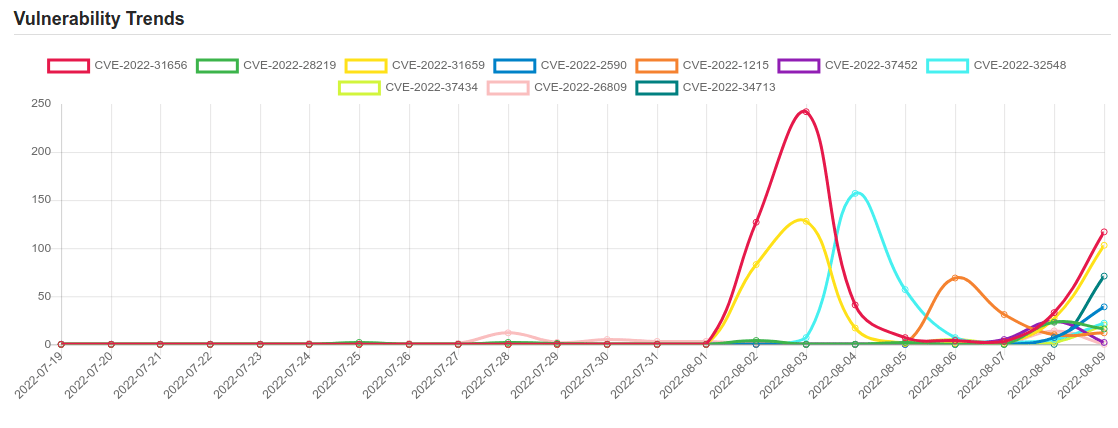Daily Vulnerability Trends: Wed Aug 10 2022

| CVE NAME | CVE Description |
| CVE-2022-20842 | No description provided |
| CVE-2022-2466 | No description provided |
| CVE-2022-31101 | prestashop/blockwishlist is a prestashop extension which adds a block containing the customer’s wishlists. In affected versions an authenticated customer can perform SQL injection. This issue is fixed in version 2.1.1. Users are advised to upgrade. There are no known workarounds for this issue. |
| CVE-2016-5195 | Race condition in mm/gup.c in the Linux kernel 2.x through 4.x before 4.8.3 allows local users to gain privileges by leveraging incorrect handling of a copy-on-write (COW) feature to write to a read-only memory mapping, as exploited in the wild in October 2016, aka “Dirty COW.” |
| CVE-2021-44228 | Apache Log4j2 2.0-beta9 through 2.15.0 (excluding security releases 2.12.2, 2.12.3, and 2.3.1) JNDI features used in configuration, log messages, and parameters do not protect against attacker controlled LDAP and other JNDI related endpoints. An attacker who can control log messages or log message parameters can execute arbitrary code loaded from LDAP servers when message lookup substitution is enabled. From log4j 2.15.0, this behavior has been disabled by default. From version 2.16.0 (along with 2.12.2, 2.12.3, and 2.3.1), this functionality has been completely removed. Note that this vulnerability is specific to log4j-core and does not affect log4net, log4cxx, or other Apache Logging Services projects. |
| CVE-2017-11882 | Microsoft Office 2007 Service Pack 3, Microsoft Office 2010 Service Pack 2, Microsoft Office 2013 Service Pack 1, and Microsoft Office 2016 allow an attacker to run arbitrary code in the context of the current user by failing to properly handle objects in memory, aka “Microsoft Office Memory Corruption Vulnerability”. This CVE ID is unique from CVE-2017-11884. |
| CVE-2022-34918 | An issue was discovered in the Linux kernel through 5.18.9. A type confusion bug in nft_set_elem_init (leading to a buffer overflow) could be used by a local attacker to escalate privileges, a different vulnerability than CVE-2022-32250. (The attacker can obtain root access, but must start with an unprivileged user namespace to obtain CAP_NET_ADMIN access.) This can be fixed in nft_setelem_parse_data in net/netfilter/nf_tables_api.c. |
| CVE-2022-36267 | In Airspan AirSpot 5410 version 0.3.4.1-4 and under there exists a Unauthenticated remote command injection vulnerability. The ping functionality can be called without user authentication when crafting a malicious http request by injecting code in one of the parameters allowing for remote code execution. This vulnerability is exploited via the binary file /home/www/cgi-bin/diagnostics.cgi that accepts unauthenticated requests and unsanitized data. As a result, a malicious actor can craft a specific request and interact remotely with the device. |
| CVE-2022-31656 | VMware Workspace ONE Access, Identity Manager and vRealize Automation contain an authentication bypass vulnerability affecting local domain users. A malicious actor with network access to the UI may be able to obtain administrative access without the need to authenticate. |
| CVE-2022-28219 | Cewolf in Zoho ManageEngine ADAudit Plus before 7060 is vulnerable to an unauthenticated XXE attack that leads to Remote Code Execution. |
| CVE-2022-31659 | VMware Workspace ONE Access and Identity Manager contain a remote code execution vulnerability. A malicious actor with administrator and network access can trigger a remote code execution. |
| CVE-2022-1215 | A format string vulnerability was found in libinput |
| CVE-2022-37452 | Exim before 4.95 has a heap-based buffer overflow for the alias list in host_name_lookup in host.c when sender_host_name is set. |
| CVE-2022-32548 | No description provided |
| CVE-2022-37434 | zlib through 1.2.12 has a heap-based buffer over-read or buffer overflow in inflate in inflate.c via a large gzip header extra field. NOTE: only applications that call inflateGetHeader are affected. Some common applications bundle the affected zlib source code but may be unable to call inflateGetHeader (e.g., see the nodejs/node reference). |
| CVE-2022-26809 | Remote Procedure Call Runtime Remote Code Execution Vulnerability. This CVE ID is unique from CVE-2022-24492, CVE-2022-24528. |
| CVE-2022-34713 | Microsoft Windows Support Diagnostic Tool (MSDT) Remote Code Execution Vulnerability. This CVE ID is unique from CVE-2022-35743. |
| CVE-2018-17144 | Bitcoin Core 0.14.x before 0.14.3, 0.15.x before 0.15.2, and 0.16.x before 0.16.3 and Bitcoin Knots 0.14.x through 0.16.x before 0.16.3 allow a remote denial of service (application crash) exploitable by miners via duplicate input. An attacker can make bitcoind or Bitcoin-Qt crash. |
| CVE-2020-6507 | Out of bounds write in V8 in Google Chrome prior to 83.0.4103.106 allowed a remote attacker to potentially exploit heap corruption via a crafted HTML page. |
| CVE-2022-2590 | Node.js git-clone module code execution | CVE-2022-25900 |
A considerable amount of time and effort goes into maintaining this website, creating backend automation and creating new features and content for you to make actionable intelligence decisions. Everyone that supports the site helps enable new functionality.
If you like the site, please support us on Patreon using the button below

To keep up to date follow us on the below channels.




![[QILIN] - Ransomware Victim: www[.]nuphoton[.]com 6 image](https://www.redpacketsecurity.com/wp-content/uploads/2024/09/image-300x300.png)